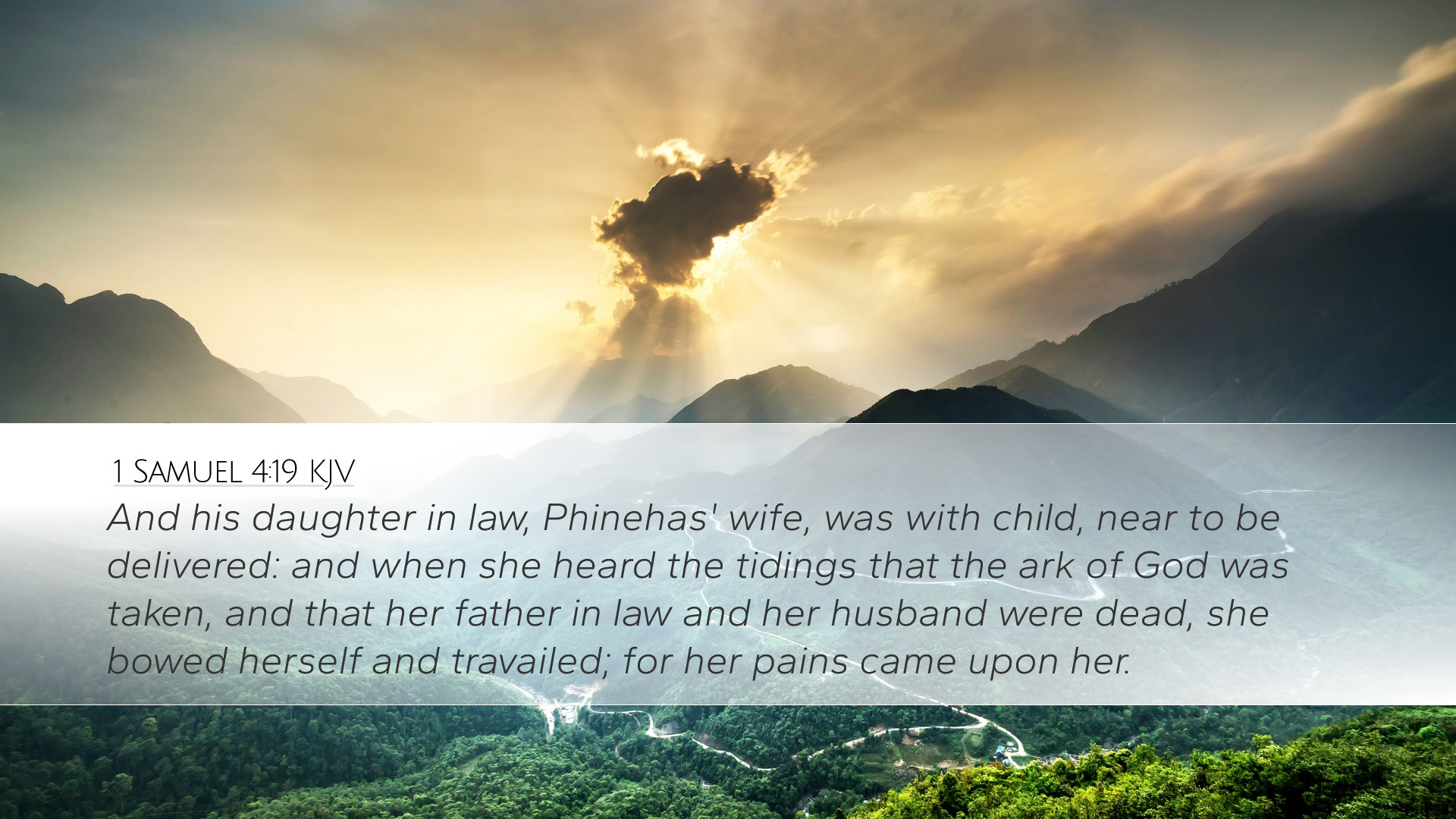Commentary on 1 Samuel 4:19
Verse: "And his daughter-in-law, Phinehas' wife, was with child, near to be delivered: and when she heard the tidings that the ark of God was taken, and that her father-in-law and her husband were dead, she bowed herself and travailed; for her pains came upon her." (1 Samuel 4:19 KJV)
Introduction
The passage in 1 Samuel 4:19 marks a significant moment in the history of Israel, revealing deep emotional and spiritual turmoil resulting from a disastrous battle with the Philistines. This commentary seeks to explore the theological implications, historical context, and emotional weight of this verse, drawing from the insights of Matthew Henry, Albert Barnes, and Adam Clarke. These reflections aim to enrich the understanding of pastors, students, theologians, and Bible scholars.
Contextual Background
The account in 1 Samuel 4 details the capture of the Ark of the Covenant by the Philistines and is a turning point for Israel. Phinehas, the son of Eli the high priest, represents a lineage that has strayed from God's covenant. The defeat in battle not only signifies military loss but is emblematic of spiritual decline.
Historical Insights
Matthew Henry emphasizes the significance of the Ark as the symbol of God's presence with Israel and its capture as a profound national calamity. He notes that the people's disregard for God culminates in this tragic outcome, where judgment falls upon the house of Eli—a theme central to the narrative of 1 Samuel.
Albert Barnes reflects on the socio-political environment of the time, explaining how Israel's reliance on the Ark was misplaced and how God permitted its capture as a means of correction. The historical context is further deepened through the juxtaposition of the Israelite fighting spirit with the Philistine's determination in battle, reflecting the consequences of Israel's unfaithfulness.
The Emotional Weight of News
This verse focuses on the reaction of Phinehas' wife upon receiving devastating news. Her condition—pregnant and about to give birth—provides a poignant backdrop to her grief and the impending loss she faces.
Insights into Phinehas’ Wife's Response
Adam Clarke provides a detailed account of Phinehas' wife, suggesting that her emotional state reflects the broader turmoil of Israel. When she hears of the Ark's capture and the deaths of her husband and father-in-law, her immediate reaction is one of despair. Clarke notes that in her moment of agony, she symbolizes the overwhelming burden that sin and loss have upon the faithful remnant of Israel.
The text expresses how overwhelming distress—evidenced by her physical labor pains—can also lead to spiritual awakening. Her travail is not only a literal response to childbirth but also an allegorical representation of the nation’s spiritual plight.
Theological Reflection
The capture of the Ark serves as a profound theological lesson regarding the presence of God and the nature of His covenant with Israel. The loss of the Ark meant the withdrawal of divine favor, and Phinehas' wife embodies the consequences of such a loss.
God’s Sovereignty and Human Response
Matthew Henry posits that the narrative encourages believers to acknowledge God's sovereignty, even in dire circumstances. Phinehas' wife is a figure of pain but also resilience, showing that even in loss, God’s hand is at work, raising questions about allegiance, idolatry, and the true nature of worship amongst His people.
Conclusion: Lessons for Contemporary Believers
1 Samuel 4:19 serves as a reminder of the gravity of spiritual fidelity amidst trials. The response of Phinehas' wife invites reflection on how we, as contemporary believers, should respond to loss, disappointment, and the apparent absence of God's blessing.
In summary, the insights from Henry, Barnes, and Clarke converge on the critical theme of remaining steadfast in faith and understanding the implications of our covenant relationship with God. As Phinehas’ wife goes into labor amidst grief, so too are we called to bear the burdens of our spiritual journeys without losing sight of divine hope.


